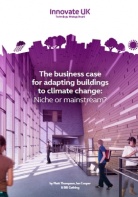The business case for adapting buildings to climate change
On 2 June 2015, at the Vision Conference in London, Innovate UK (previously the Technology Strategy Board) launched the final report of the Design for Future Climate: Adapting Buildings (D4FC) programme, 'The business case for adapting buildings to climate change: Niche or mainstream?' by Matt Thompson, Ian Cooper and Bill Gething. The launch of the full report followed publication of an Executive Summary in November 2014.
The report is the culmination the 4-year D4FC programme which included work by 240 companies and generated a body of evidence about how buildings exposed to climate risks can be adapted. It responds to the Government's National Adaptation programme and considers adaptation to climate change at the scale of individual buildings.
The report is based on the observations from a designers group and a client's group and assesses the key drivers affecting the market for design services to adapt buildings in preparation for a changing climate. In the foreword, Mark Wray, Lead Technologist in the Built Environment team at Innovate UK suggests that, “The subject is complex and full of uncertainties, but for firms who respond it seems likely that there will be early adopter commercial advantages as climate hazards become more prevalent and as pressure on clients to consider adaptation grows. Properly managed and exploited, the momentum gained should put the UK at the forefront of the dawning international market for adaptation services in the built environment, which grew by over 5% last year.”
The report proposes that the challenge is to optimise building design for a phased transition to anticipated future needs, making use of maintenance cycles for upgrades. It sets out seven key messages:
- The market for design services to adapt buildings to future climate change remains very limited.
- The limited market is not an excuse for building design professionals to do nothing.
- Construction clients risk procuring stranded assets.
- The government must signal that adaptation in the built environment is a critical issue.
- At present, the construction and property industries have no adaptation plan to tackle climate change.
- Clients and professionals urgently need educating in climate change adaptation for buildings.
- There is a need for a programme of monitoring and evaluating the performance of climate adapted buildings.
It suggests that lack of willingness by clients to engage with the problem dampens designers motivation and reduces the scope for the market to develop, but the report identifies mounting pressure on clients from the insurance industry, investment institutions and financial stakeholders.
Recommendations include:
- Developing construction client decision-making tools.
- Updating standard terms and conditions to account for climate change adaptation services.
- Developing a protocol for assessing the risk to buildings from climate change hazards.
- Develop computational tools to standardise the way that climate change projections are used by designers.
- Updating standards, planning and building regulations to accommodate climate change adaptation, including the use of future weather data in the building regulations at their next revision.
- Public procurement and maintenance regimes considering future climate change and the development of buildings with adaptive capacity.
- Establishing a programme of research to reduce the uncertainty of future climate impacts on the built environment at the local site-based scale.
[edit] Find out more
[edit] Related articles on Designing Buildings Wiki
- Building engineering physics.
- Energy targets.
- Environmental policy.
- Green deal.
- Greenhouse gases.
- Hex House project.
- Innovate UK.
- Kyoto protocol.
- Stranded assets.
- Sustainability.
- Sustainable materials.
- The Carbon Plan: Delivering our low carbon future.
- The Low Carbon Transition Plan: National strategy for climate and energy.
- UK Climate Change Risk Assessment.
- Zero carbon homes.
- Zero carbon non-domestic buildings.
Featured articles and news
Apprenticeships and the responsibility we share
Perspectives from the CIOB President as National Apprentice Week comes to a close.
The first line of defence against rain, wind and snow.
Building Safety recap January, 2026
What we missed at the end of last year, and at the start of this...
National Apprenticeship Week 2026, 9-15 Feb
Shining a light on the positive impacts for businesses, their apprentices and the wider economy alike.
Applications and benefits of acoustic flooring
From commercial to retail.
From solid to sprung and ribbed to raised.
Strengthening industry collaboration in Hong Kong
Hong Kong Institute of Construction and The Chartered Institute of Building sign Memorandum of Understanding.
A detailed description from the experts at Cornish Lime.
IHBC planning for growth with corporate plan development
Grow with the Institute by volunteering and CP25 consultation.
Connecting ambition and action for designers and specifiers.
Electrical skills gap deepens as apprenticeship starts fall despite surging demand says ECA.
Built environment bodies deepen joint action on EDI
B.E.Inclusive initiative agree next phase of joint equity, diversity and inclusion (EDI) action plan.
Recognising culture as key to sustainable economic growth
Creative UK Provocation paper: Culture as Growth Infrastructure.
Futurebuild and UK Construction Week London Unite
Creating the UK’s Built Environment Super Event and over 25 other key partnerships.
Welsh and Scottish 2026 elections
Manifestos for the built environment for upcoming same May day elections.
Advancing BIM education with a competency framework
“We don’t need people who can just draw in 3D. We need people who can think in data.”






















